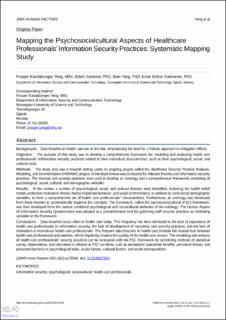| dc.description.abstract | Background:
Data breaches in health care are on the rise, emphasizing the need for a holistic approach to mitigation efforts.
Objective:
The purpose of this study was to develop a comprehensive framework for modeling and analyzing health care professionals’ information security practices related to their individual characteristics, such as their psychological, social, and cultural traits.
Methods:
The study area was a hospital setting under an ongoing project called the Healthcare Security Practice Analysis, Modeling, and Incentivization (HSPAMI) project. A literature review was conducted for relevant theories and information security practices. The theories and security practices were used to develop an ontology and a comprehensive framework consisting of psychological, social, cultural, and demographic variables.
Results:
In the review, a number of psychological, social, and cultural theories were identified, including the health belief model, protection motivation theory, theory of planned behavior, and social control theory, in addition to some social demographic variables, to form a comprehensive set of health care professionals’ characteristics. Furthermore, an ontology was developed from these theories to systematically organize the concepts. The framework, called the psychosociocultural (PSC) framework, was then developed from the various combined psychological and sociocultural attributes of the ontology. The Human Aspect of Information Security Questionnaire was adopted as a comprehensive tool for gathering staff security practices as mediating variables in the framework.
Conclusions:
Data breaches occur often in health care today. This frequency has been attributed to the lack of experience of health care professionals in information security, the lack of development of conscious care security practices, and the lack of motivation to incentivize health care professionals. The frequent data breaches in health care threaten the mutual trust between health care professionals and patients, which implicitly impacts the quality of the health care service. The modeling and analysis of health care professionals’ security practices can be conducted with the PSC framework by combining methods of statistical survey, observations, and interviews in relation to PSC variables, such as perceptions (perceived benefits, perceived threats, and perceived barriers) or psychological traits, social factors, cultural factors, and social demographics. | en_US |

